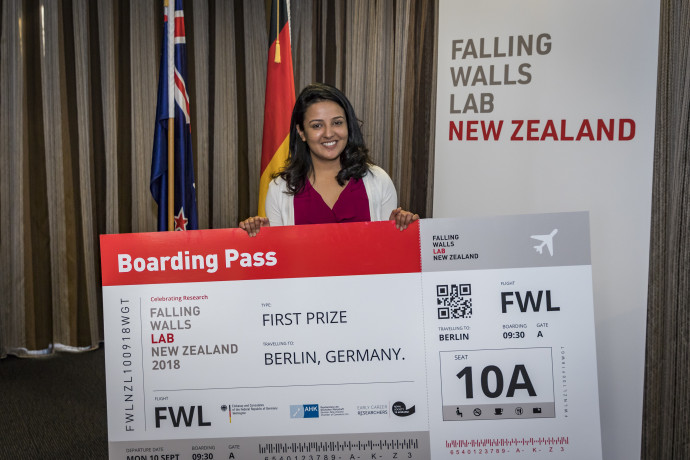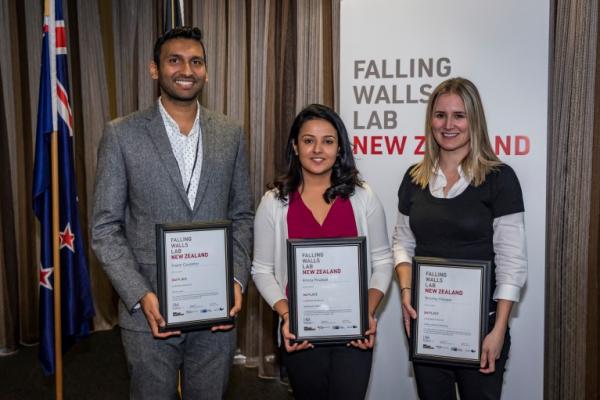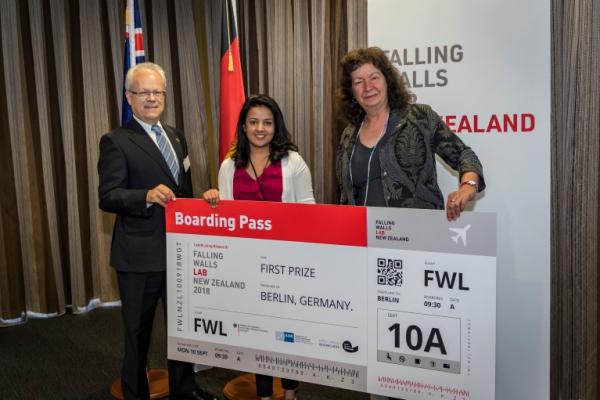Winners 2018

Attempting to break down the wall of inefficient filters has won Ankita Poudyal from AUT University the chance to compete at the Falling Walls Lab final in Berlin in November. She was selected from 19 early career researchers competing from New Zealand and the Pacific, who pitched their ideas at the New Zealand Falling Walls Lab held by Royal Society Te Apārangi this week, with support from the German Embassy in Wellington.
Crunchy isn't an ideal description for the air you are breathing, but increasing amounts of particulates in air, particularly in urban environments, means 'crunchy air' can be an apt description. Most commercial filters work by having pores smaller than the particles, so the particles can't pass through. But the tiny pores required to stop the particles means it's hard for air to flow through the membrane, which means the filters can clog, need replacing, or require a lot of energy to pump air through them. Ankita told the audience how she is solving this problem by creating filters that can chemically trap particles but still allow air to easily flow through the filter. To do this she is making use of a type of surface-modification technology called Kode™ Technology, co-invented by AUT Professor Steve Henry, which allows the filters to be made from nanofibres with a surface coating that can actively capture the particles, and her results to date are very promising.
The second place winner was Frazer Coutinho from the University of Auckland who is seeking to break the wall of vision loss. One of the issues of an aging population is the increase in age-related macular degeneration that blurs central vision as the cells in the retina of the eye deteriorate. Frazer is developing a potential treatment with a peptide that can protect the retinal cell layers from degradation, thus preserving vision.

Slow and steady tortoises may win the race, but when it comes to safety at work, fast action by hares who move without thinking is best. Third place winner Brionny Hooper from Scion is aiming to break the wall of safety without thinking. She told the Falling Walls Lab audience that experienced staff act as 'hares' in risky situations, instinctively taking action to avoid accidents, but how can new staff learn to be 'hares' in days or months rather than years? Brionny is developing a novel training programme using virtual reality headsets to help transfer knowledge from experienced staff to newer employees.
Some of the the other novel solutions the audience heard about included tackling unaffordable housing, building better expert linkages for pest management, waste minimisation in the building industry, developing titanium processing in New Zealand, developing foods as medicine and mobile learning in the Pacific Islands.
Falling Walls Labs are held at locations across the globe and the winners from each Lab are invited this year to the Falling Walls Lab final in Berlin in November.
Falling Walls Lab gives emerging bright minds the chance to promoting their ideas and fostering interdisciplinary network, and perhaps become the next big success story in innovation. It provides an opportunity for early career researchers and innovative thinkers to share, in 3 minutes, their idea, research project, or social initiative from all disciplines, to their peers, the interested public and a distinguished jury.
As the winner of Falling Walls Lab New Zealand, Ankita Poudyal not only wins a trip to Germany to present her idea at the Falling Walls Lab final in Berlin, she also gets to attend the Falling Walls Conference.
The global event is run by The Falling Walls Foundation, a non-profit organisation in Berlin, dedicated to the support of science and the humanities. It was established in 2009, 20 years after the fall of the Berlin Wall. At its heart is the question ‘Which are the next walls to fall?’ as a result of scientific, technological, economic and sociological breakthroughs.

German Ambassador to New Zealand, H.E. Mr Gerhard Thiedemann, winner Ankita Poudyal and President of Royal Society Te Apārangi, Professor Wendy Larner
Royal Society Te Apārangi Chief Executive Dr Andrew Cleland said that today's wacky ideas can become tomorrow's accepted norms and that Falling Walls Lab is all about supporting the development of new ideas for a brighter future.
“This year, thanks to support from the German Embassy in Wellington, we are very pleased applicants from Pacific Island Forum Nations, in particular students at the University of South Pacific and Pacific Community (SPC), were able to travel to New Zealand to take part in the Falling Walls Lab New Zealand event,” says Dr Cleland.
“The New Zealand Falling Walls Lab event offers an opportunity for the Society and the German Embassy to foster the sharing of new ideas and to create networking opportunities for early career researchers from New Zealand and the Pacific Islands.”
Falling Walls Lab New Zealand was additionally supported by the Royal Society Te Apārangi Early Career Researcher Forum, and the German–New Zealand Chamber of Commerce.
Winners Presentations:
First place
Ankita Poudya (AUT University) for her presentation 'Breaking the Walls of inefficient air filters'.
Second place
Frazer Coutinho (University of Auckland) for his presentation 'Breaking the Walls of vision loss'.
Third place
Brionny Hooper (Scion) for her presentation 'Breaking the Walls of safety without thinking'.
